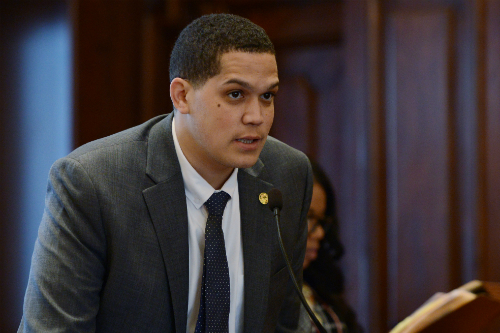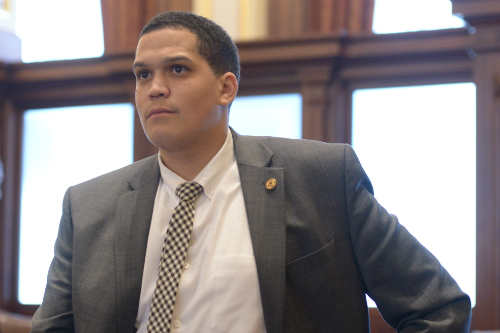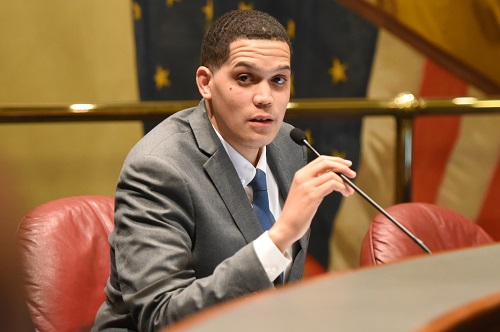Peters announces special senior-only hours at area grocery stores
- Details
- Category: News

“Since seniors are at the greatest risk of not only contracting the coronavirus, but experiencing the worst of its symptoms, it’s important to provide them with a situation in which they can shop for the groceries and supplies they need with a lower chance of being exposed to the virus,” Peters said.
See below for a list of stores in the 13th District that have announced senior-only hours. Many of these stores also extend these hours to those with compromised immune systems, though this varies, as does the age defined as “senior.” For more information or to find a location near you, visit the specific store’s website by clicking on its name.
Costco: Tuesdays and Thursdays from 8 a.m. – 9 a.m.
Dollar General: Every day, for the first hour the store is open
Food 4 Less: Tuesdays and Fridays from 7:30 a.m. – 8:30 a.m.
Jewel-Osco: Tuesdays and Thursdays from 7 a.m. – 9 a.m.
Mariano’s: Every day, from 6 a.m. – 8 a.m.
Target: Wednesdays, for the first hour the store is open
Trader Joe’s: Mondays, from 9 a.m. – 10 a.m.
Walgreens: Tuesdays, from 8 a.m. – 9 a.m.
Whole Foods: Every day, for one hour prior to the store’s scheduled opening time
Peters moves to expand civics education to juvenile justice centers
- Details
- Category: Press Releases

“When young people are released from incarceration, we need to let them know about their restored voting rights and that we value their civic participation,” Peters said. “Our justice system needs to be rehabilitative and teach people how to be responsible citizens, and that includes how to exercise their voices in our democracy.”
Senator Peters passed the Re-Entering Citizens Civics Education Act last year, which requires the Department of Corrections to provide peer-led civics education courses to incarcerated people who will be released within 12 months. His new bill will expand those courses to the Department of Juvenile Justice.
“Whether a child is in our juvenile justice system or our public school system, they deserve to learn about their civic rights and duties,” Peters said.
This measure also clarifies that the civics courses must include 270 minutes of instruction taught by two co-facilitators. The co-facilitators must be trained by nonpartisan civil organizations.
Senate Bill 3241 passed the Senate Criminal Law Committee and awaits consideration before the full Senate.
Peters moves to help foster youth apply for college financial aid
- Details
- Category: Press Releases

“The state needs to be proactive at helping foster kids build a strong future during their final years of care,” Peters said. “We need to do all we can to ensure that they have access to education or job training before they have to live on their own.”
Senator Peters’ measure requires the Department of Child and Family Services to assist all youth in their care with completing the Free Application for Federal Student Aid (FAFSA) during their final year of high school. The legislation is an initiative of the National Association of Social Workers.
In addition, Senator Peters pledges to support legislation that would make college more accessible to Illinois students.
“Education should lead people to prosperity, not inescapable debt to student loan sharks,” Peters said. “We should not be punishing people with fines and fees for wanting to expand their education and contribute more to society.”
Senate Bill 3718 awaits consideration before the Senate Human Services Committee.

Peters works with treasurer to provide boost to small businesses
- Details
- Category: Press Releases
SPRINGFIELD – To foster local economies, encourage job creation and give mom-and-pop shops the tools to thrive, State Senator Robert Peters (D-Chicago) has sponsored a bill that would will give local businesses greater access to low-interest loans.
“Small businesses help provide jobs to our neighbors and can strengthen our district’s economy,” said Peters. “By giving a greater number of prospective business owners the chance to take out a loan, we’re helping them build and expand their businesses which will be extremely beneficial to everyone in the community.”
The measure is an initiative of the Office of Illinois State Treasurer Michael Frerichs. The legislation would give the treasurer authority to deposit state money in approved financial institutions at below-market interest rates. Those financial institutions must then use that money to provide loans for economic and community development projects at lower interest rates, stimulating business growth across the state.
Currently, the treasurer must obtain the governor’s approval for these investments, which can cause impractical delays in a fast-paced financial market.
“This measure would streamline the investment process and provide help to entrepreneurs who might not otherwise have had access to a loan,” said Peters. “When we invest in small businesses, our neighborhoods benefit.”
Senate Bill 2968 passed the Senate Financial Institutions Committee Wednesday and will now be sent to the full Senate for consideration.
More Articles …
Page 82 of 96





